Chapter IX: The family
- Entire (2.56 Mo)
- Part 1 (788 Ko)
- Part 2 (687 Ko)
- Part 3 (1.28 Mo)
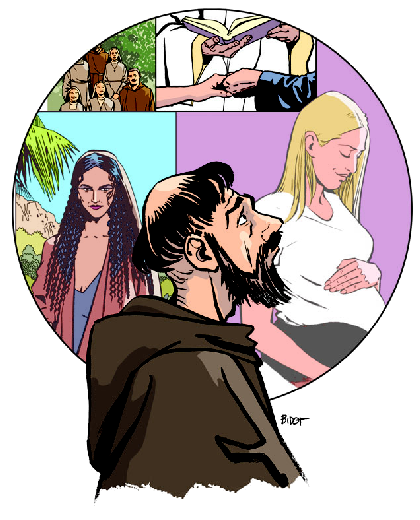 We will begin by rereading these first lines of Genesis which enlighten all conjugal and family existence.Then, though Francis wrote nothing specifically about family life, we will find in certain of his writings several lines perfectly attuned to the family. Finally, we will end our chapter by the meditation of article 17 of our Rule, which begins with the words which are a synonym of agape Love: In their family, they will live...
We will begin by rereading these first lines of Genesis which enlighten all conjugal and family existence.Then, though Francis wrote nothing specifically about family life, we will find in certain of his writings several lines perfectly attuned to the family. Finally, we will end our chapter by the meditation of article 17 of our Rule, which begins with the words which are a synonym of agape Love: In their family, they will live...
- 0
IN THE BEGINNING
Male and female He created them
In Genesis, we see that man’s creation is both masculine and feminine. It is complete only through woman’s creation. That is what the two successive creation narratives tell us: the priestly narrative (Gen 1:26-27) and the divine one (Gen 2:18-27). As we already mentioned in this manual’s first chapter, it follows from the two creation narratives that it is man and woman, taken together, who are in God’s total image. Each taken separately is only a partial image. So, both are complementary and equal in dignity. This conclusion is suggested to us by these two creation stories which are expressed in very different terms but are fundamentally the same. Indeed, whereas the first narrative shows us man and woman created together to be together in God’s image, in the second account, man, created by God's very special act, is for this reason superior to all other beings of creation and finds only in woman a being who is similar to him. * P. André FEUILLET, P.S. Sulp., JESUS AND HIS MOTHER from Saint Luke’s infancy narratives and from Saint John – The Virgin Mary’s role in salvation’s history and women’s place in the Church, J. Gabalda and Co. Editors, 1974, p. 202. The main part of the developments contained in the first four paragraphs of this chapter are extracted from pp. 201 - 213 of this work (reshaped extracts, notes having been added). So we understand the prophets’ language which compares God's love sometimes to paternal love and sometimes to maternal love. The primary source of both is found in God and only in Him.
However, by the Creator’s own will, woman, so different from man, is in a way his completion. That is why it is solely following woman’s creation that man says a warm yes to the creation made by God. Such is the second truth taught by the divine narrative of creation. God himself proclaims that it is not good for the man to be alone (Gen 2:18). If solitude and silence are like sacraments which give us God (I will lead her into the desert and speak to her heart - Hos 2:13), selfish isolation is worthless for man. When God says, “I will make a suitable partner for him.” (Gen 2:18), it is not only about forming the first couple with a view to the multiplication of humankind. Of this multiplication there is not the slightest allusion in the extraordinary scene from Gen 2:18-24, which begins with these words: It is not good for the man to be alone… and ends with: and they become one flesh. Material help that the woman can bring to the man is not moreover what is aimed at in the first place for, in this respect, animals are also a help to man. The Hebrew text, translated literally, means: a help for man who is his perfect counterpart, his perfect partner (word for word: “as in front of him”). In Gen 2:18-25, the emphasis is on the irreplaceable spiritual help that the woman brings to man: man needs a being with the same nature as himself who makes him come out of his spiritual isolation through the sharing of ideas and a mutual effusion of feelings.

Bone of my bones and flesh of my flesh
In all respects (and not only biologically which is only one aspect of an incomparably richer reality), man requires a helpmate similar to himself. Man, “bearer of the logos (i.e. the verb, the word as revelation), who needs to speak, to name and describe” while “woman knows in silence”, is charged by God himself to name all the beings of creation: So the Lord God formed out of the ground various wild animals and various birds of the air, and he brought them to the man to see what he would call them; whatever the man called each of them would be its name. This designation by name is a secondary act of creation in which man mentally appropriates these creatures as objects. But man does not find among all these beings any match for himself. As rich and beneficial as this new universe is, having awakened in man a nostalgia for a being of the same nature, it does not yet contain the corresponding partner. Man looks for this helpmate until the time that God builds from him a being who is like his other half and without whom, in every way, he would remain incomplete. And it is only then that man knows an unmitigated joy: This one, at last, is bone of my bones and flesh of my flesh (Gen 2:23).
Beneath its naive appearance, the biblical text is full of meaning. Adam was looking for a helpmate who was at one and the same time similar and different. He discovers with amazement that the person in front of him is not actually another him; she is another facet of his being, but one that he can only relate to as a “you”. Through her love, the woman somehow brings about man’s birth, to himself as well as to others. In this way, man, by naming the woman, gives himself a name: This one shall be called 'woman,' for out of 'her man' this one has been taken (the Hebrew plays on the words ishsha “woman” and ish “man”).
Woman is the glory of man
Saint Paul also suggests to us the truth developed in the Genesis text. According to the Gentiles’ Apostle, man is the image and glory of God, but woman is the glory of man (1 Co 11:7). Let us understand what this means; it is not (at all) a way to demean woman. Saint Thomas of Aquinas, in the commentary to this passage, notes that Paul avoids using the word “image” for woman (man’s image, he should have written), because she is also the direct image of God. But she is at the same time man’s glory. However, in the New Testament, the word glory is used several times to mean the source or means of glorification. Man is the glory of God in the sense that he glorifies Him by manifesting His attributes. Woman is the glory of man in the sense that she glorifies him, giving him honor, because she is not only his equal but his completion, and she brings him, through this complementarity, an irreplaceable wealth, as the second creation narrative shows: in it, she is that helpmate who the first man specifically needed and who he is so proud of. If the woman is such wealth for man, bone of his bones, flesh of his flesh, she must nevertheless not seek man’s gaze and desire for herself and her beauty, just like man must limit his desire for woman.
If Adam leaving the Creator’s hands attaches himself to Eve, it is because he finds in her the completion of God’s image which he is himself, i.e. none other than the manifestation of the Creator’s love for him. By sending his own image back to Adam which is an image of God, Eve turns Adam towards God. Moreover, man and woman taken together cannot achieve plenitude without renouncing themselves and turning to God, for, made in God’s image, they have the duty to become always more of what they are already: “God’s image”.
Be fruitful, multiply, fill the earth and subdue it
In the first pages of Genesis we already have a glimpse of how profoundly man and woman, though equal in dignity, are different and complementary, not only physiologically but also psychologically. There is nothing arbitrary about the differentiation of the functions attributed by the Creator to man and woman; the differentiation is inscribed in their very being.
A product of clay, man is, more than woman, turned toward the exterior world from which he came; he must use his strength to conquer and cultivate it. Of course, it is to man and woman taken together that the priestly narrative assigns a sort of Viceroyalty of the universe: Multiply; fill the earth and subdue it (Gen 1:28). But the divine narrative suggests that in this domain the initiative falls on the man. He is charged with subduing the material universe, a role he will only be able to fulfill well if he himself remains submissive to God; moreover, after the fall, the material universe is in revolt against man who tries to subjugate it to himself, because man himself rebelled against God (Gen 3:17-19): To the man he said: "Because you listened to your wife and ate from the tree of which I had forbidden you to eat, "Cursed be the ground because of you! In toil shall you eat its yield all the days of your life…
As for woman, a completely different and in many ways more noble function is given to her. She is born, not from some clay of the ground like man, but from one of the first man’s ribs, near the heart of man. And so it is that she is above all turned to the person in order to educate and help man progress by turning him towards God! Doesn’t she help the first man progress in the knowledge of his vocation? It is only through seeing her that he fully understands what he is himself and what he is in relation to the Creator. It is in her essential activities (like mother and wife) that woman is struck down by condemnation after the fall: I shall give you intense pain in childbearing, you will give birth to your children in pain. Your yearning will be for your husband, and he will dominate you.
These are the loss of rights of the original state (which are, as we see, specific to the essential activity of both). They are not then to be seeked after as such or are not destined to justify behaviors that we could qualify as deviant (man should not subject his wife to his domination. Saint Paul will write: Wives, be subject to your husbands (Eph 5:22). He does not write: husbands, subjugate your wives). To these losses are added death (Gen 3:19) and the loss of divine familiarity (Gen 3:23). These are inherited punishments. Christ the Savior will come to redeem humanity. He will reconcile man to his Creator ; finally, through his resurrection, He will obtain victory over death.
They become one flesh
Must this affirmation from Genesis be understood only in the carnal sense, even if it fully includes it ? If that was the case, wouldn’t it be guilty of a certain idolatry of sexuality, which would be injurious to woman as well as man? To answer these questions, we will (in part) get help from the work of a XXth century Christian philosopher * Marcel CLEMENT, Singleness of Heart, Singleness of Soul, Singleness of Flesh, Editions de l’escalade (Climbing Edition) 1977, extracts pages 42 - 48, then pages 55 - 59. , a work whose title : Singleness of Heart, Singleness of Soul, Singleness of Flesh, already shines an invaluable light on the answer to the questions asked above.
Man leaves his father and mother: without any disowning of his parents, Genesis teaches us that the fulfillment of man’s unique vocation requires “parental separation”.
 Genesis also specifies the “why” of this necessary rupture: to cling to his wife. We sense in this that all human beings are called to give themselves in marriage. Marriage, firstly, is made in Mary and in the Church, because all souls, made spotless and immaculate by the Son of God’s sacrifice, are called to consent to this union of love with Christ who redeemed them at the cost of his blood. Certain souls are marked from all eternity to consecrate their virginity to the divine spouse. These souls, our Supreme Pontiff Pius XII tells us, “renouncing the joys of the flesh in marriage, are looking for its secret meaning, and instead of imitating what happens in marriage, aspire to what it symbolizes” * Pius XII, Encyclical De Sacre Virginitate.. For as noble as it is in its simple human reality, the sacramental wedding is even more and by grace the sign of the very perfect union of Christ and his Church (Eph 5:32). Thus it is by meditating on the everlasting fertility of uncreated Love that we can understand, enlightened by its highest light, the ultimate meaning of the spouses’ temporal union manifested in a mutual, indissoluble and fertile giving. It is not then only physical. The simple physical fertility of plants and animals has no spiritual reality of knowledge and love. In contrast, the marriage of man and woman is at the same time a spiritual and physical reality. It requires spiritual knowledge and love, tenderness of hearts and merging of bodies. Because man and woman are made in God’s image but formed in a living flesh subjected to generated growth as well as the degeneration of corruption, they must both contemplate the mystery of divine love which lives in their soul and accept the humility of human love, with its timidness, impatience and constraints. Absolute in its spiritual determination, dependant on the constraints of the flesh in its most humble expression, a spouse’s love requires a gentle but slow and long patience to bloom in a growing unity. This patience is even more necessary given that humanity’s invisible enemy refuses, in a corresponding movement of hate, the Verb’s incarnation, and his image: the incarnation of love in marriage. Love between a man and a woman is thus continually threatened by Satan who sometimes suggests contempt of the flesh, its creation, and other times persuades the spouses to make it an absolute, an idol, and to delight there endlessly and unceasingly. In both temptations, it is always the fecundity of love that the demon attacks, with the goal of annihilating love itself.
Genesis also specifies the “why” of this necessary rupture: to cling to his wife. We sense in this that all human beings are called to give themselves in marriage. Marriage, firstly, is made in Mary and in the Church, because all souls, made spotless and immaculate by the Son of God’s sacrifice, are called to consent to this union of love with Christ who redeemed them at the cost of his blood. Certain souls are marked from all eternity to consecrate their virginity to the divine spouse. These souls, our Supreme Pontiff Pius XII tells us, “renouncing the joys of the flesh in marriage, are looking for its secret meaning, and instead of imitating what happens in marriage, aspire to what it symbolizes” * Pius XII, Encyclical De Sacre Virginitate.. For as noble as it is in its simple human reality, the sacramental wedding is even more and by grace the sign of the very perfect union of Christ and his Church (Eph 5:32). Thus it is by meditating on the everlasting fertility of uncreated Love that we can understand, enlightened by its highest light, the ultimate meaning of the spouses’ temporal union manifested in a mutual, indissoluble and fertile giving. It is not then only physical. The simple physical fertility of plants and animals has no spiritual reality of knowledge and love. In contrast, the marriage of man and woman is at the same time a spiritual and physical reality. It requires spiritual knowledge and love, tenderness of hearts and merging of bodies. Because man and woman are made in God’s image but formed in a living flesh subjected to generated growth as well as the degeneration of corruption, they must both contemplate the mystery of divine love which lives in their soul and accept the humility of human love, with its timidness, impatience and constraints. Absolute in its spiritual determination, dependant on the constraints of the flesh in its most humble expression, a spouse’s love requires a gentle but slow and long patience to bloom in a growing unity. This patience is even more necessary given that humanity’s invisible enemy refuses, in a corresponding movement of hate, the Verb’s incarnation, and his image: the incarnation of love in marriage. Love between a man and a woman is thus continually threatened by Satan who sometimes suggests contempt of the flesh, its creation, and other times persuades the spouses to make it an absolute, an idol, and to delight there endlessly and unceasingly. In both temptations, it is always the fecundity of love that the demon attacks, with the goal of annihilating love itself.
 The spouses’ spiritual intimacy, precisely in so far as the sacrament which unites them reproduces the union of Christ and his Church, is the deepest and the most total which can unite two baptized people on this earth. It is the intimacy of two people which the sacrament unites in such an internal way that, lived to its fullness, can bring about the communion of hearts, souls and spirits in the purpose of their vocation. What are they agreeing to, by their sacramental “yes”, those who decide to have a spouse? Essentially to an intimacy which will no longer be simply the free and reversible union of the fiancés’ souls, but will be the irrevocable offering of the soul of one to the other, to work together in the new and joint vocation which will express itself in the “possession” of their bodies. It is then, in a way, a title deed that each spouse gives to the other: My lover belongs to me and I to him (Song 6:3). But naturally, the reciprocal rights which arise from this mutual belonging are measured by the end to which they are ordained: the fecundity of love and happiness of this love. In other words, the exclusive aspect of this property, that each gives himself wholeheartedly to the other, means a continual mutual respect for the outpouring freedom of the other. If each of the spouses throughout their married life remains concerned about giving themselves and not taking, concerned with devoting themselves to the other and not with receiving the other’s devotion, shows thoughtfulness in helping the other, offering comfort, hoping in and consoling the other, and when necessary, forgiving the burden of the other, this mutual belonging in the vocation of marriage will have its true meaning: the affectionate and permanent sacrifice, free and spontaneous, of each one for the other.
The spouses’ spiritual intimacy, precisely in so far as the sacrament which unites them reproduces the union of Christ and his Church, is the deepest and the most total which can unite two baptized people on this earth. It is the intimacy of two people which the sacrament unites in such an internal way that, lived to its fullness, can bring about the communion of hearts, souls and spirits in the purpose of their vocation. What are they agreeing to, by their sacramental “yes”, those who decide to have a spouse? Essentially to an intimacy which will no longer be simply the free and reversible union of the fiancés’ souls, but will be the irrevocable offering of the soul of one to the other, to work together in the new and joint vocation which will express itself in the “possession” of their bodies. It is then, in a way, a title deed that each spouse gives to the other: My lover belongs to me and I to him (Song 6:3). But naturally, the reciprocal rights which arise from this mutual belonging are measured by the end to which they are ordained: the fecundity of love and happiness of this love. In other words, the exclusive aspect of this property, that each gives himself wholeheartedly to the other, means a continual mutual respect for the outpouring freedom of the other. If each of the spouses throughout their married life remains concerned about giving themselves and not taking, concerned with devoting themselves to the other and not with receiving the other’s devotion, shows thoughtfulness in helping the other, offering comfort, hoping in and consoling the other, and when necessary, forgiving the burden of the other, this mutual belonging in the vocation of marriage will have its true meaning: the affectionate and permanent sacrifice, free and spontaneous, of each one for the other.
In a manner of speaking, we can go so far as to say that consent is concerned with a mutual transparency of the spouses’ souls. Neither has the right to force the other. But if the simplicity of the hearts in the light of the Holy Spirit lead the two spouses to show themselves as they really are to one another, with their faults and weaknesses, selfishness and pride, desire to be helped…or sometimes fear of being helped “too much”, then they will already be, in their souls and in truth, in full view of each other. Knowing each other without lies, forgiving without reservation, they will achieve through this spiritual stripping away a nudity in the souls’ abandonment which will give its full meaning to the gestures which reveal, in the tender abandon of their bodies, what is only given in marriage. That this is God’s plan is without doubt. For it is before the original fall that Genesis concludes: … the two of them become one body. The man and his wife were both naked, yet they felt no shame (Gen 2 :24-25).
What is the family ?
To go back to the origin of God's creative gesture is a necessity for the family if the members want to know each other and to become their true selves according to the deep truth not only of their being, but also at the level of their action in history. The family is constituted as a “profound community of life and love” * Ecumenical Concil. Vat. II, Pastoral const. on the Church in the world at this time Gaudium et Spes, 48.. And the family has the mission to become always more of what it is, i.e., a community of life and love, in a tension which will find its completion - as any created and saved reality - in the Kingdom of God. From the perspective which joins reality’s roots, it must be said that the essence of the family and its duties are defined by love. That’s why the family receives the mission to keep, reveal and communicate love. This love is a living reflection and real participation in God’s love for humanity and in Christ the Lord’s love for the Church his spouse.

It is then in God the Creator and Redeemer’s plan that the family discover not only its « identity », what it « is », but also its « mission », what it can and must “do”. Family, “become” what you “are” * John-Paul II, Apostolic exhortation Familiaris Consortio, § 17, Pierre TEQUI Editor 1981.: a profound community of life and love.
FRANCIS’ EXHORTATIONS FOR THE FAMILY
When Francis recommended charity, it was family life, with its goodwill and warmheartedness, that he wanted to see reign (2 C 180). “I want,” he said, “my brothers to all be as brothers of the same mother; if one asks for a tunic, some rope or anything, that the other generously give it to him…”. And so as to give no order that he himself had not accomplished first through Christ, he gave the example first.
We do not find in Francis’ narrative any texts which are addressed specifically to the family. However, many of his writings are directly “applicable” to it. To pursue these thoughts in greater depth, we will look again at some of his writings. We will find, once again, that Francis' spirituality, however directed it is towards God One and Triune, is a "practical" spirituality, one to put into practice in a concrete way in our everyday life; for Francis, it is indeed the nuptials of the soul with Christ which are looked for, but they come to fruition in everyday life. As we might imagine, these diverse texts don’t give us a complete presentation of what must enliven family life, but they will enlighten us greatly. To introduce them, let us put the five following questions to Francis, and see what answers he has to offer us.
- What do I do in a family so that “everything goes well”?
- What do I do in a family when "everything goes wrong »?
- How, in a family, do I help my spouse in need, or my brother, sister, child, father or mother ?
- What means can I use to prepare myself to live by and then live by without fail, the divine commandment : you will not commit adultery ?
- And finally, what puts vice to flight ?
Neither quarrels nor slander, but brotherly love and a spirit of poverty
How do you reconcile a spirit of poverty and family life, you may ask yourself. Is there even any connection between the two? Do we not share “everything” in a family,without needing to think, when we share, about any spirit of poverty? The following lines will bring some answers to these questions.
 It just so happens that in a couple’s life, in family life, many moments of existence are gratifying for the individuals. If we take a meteorological metaphor, it would be the “shining sun” in a “cloudless blue sky”. But in the same way that “the mood of the sky” is not constant, there are also days in a couple’s and family’s life which are “cloudy”, “rainy”, “stormy” or even worse, “cataclysmic”. The possible causes for these bad days are, of course, varied. They can be a consequence of simple tiredness; then it “happens fast”; we speak without thinking and a conflict erupts. They can arise from an assertive character, a self-willed character, from a lack of virtue of one, a possessive or selfish love of the other, from laziness of one or an exaggerated love of order of the other, of the lessening of feelings of love, … One of the first consequences of these faults is the appearance of opposition from the other. The partner will say (or think): “I didn’t get married to hear or be subjected to that; if I don’t react immediately, it will continue.” The child in turn will say: “He started it”, trying to justify (and “absolve”) the brutality of his reaction. In short, nothing is allowed to pass without some kind of reaction: an eye for an eye, a tooth for a tooth. And one will look to bring all the family circle to his cause to begin with and then beyond the family circle afterward. One will bring up other older unpleasant events to show that “the cup is running over”… The individual has at his disposal then a weapon, the most formidable of all, to express his hate: his tongue. To avoid bad days happening or multiplying, Francis gives a « recipe » in his first rule (1 Rule 11): And let all the brothers take care not to calumniate anyone, nor to contend in words let them indeed study to maintain silence as far as God gives them grace. Let them also not dispute among themselves or with others, but let them be ready to answer with humility, saying: "we are unprofitable servants." And let them not be angry, for "whosoever is angry with his brother shall be in danger of the judgment. And whosoever shall say to his brother, Raca, shall be in danger of the council. And whosoever shall say, Thou fool, shall be in danger of hell fire." And let them love one another, as the Lord says: "This is My commandment, that you love one another, as I have loved you." And let them show their love by the works they do for each other, according as the Apostle says: "let us not love in word or in tongue, but in deed and in truth." Let them "speak evil of no man," nor murmur, nor detract others, for it is written: "Whisperers and detractors are hateful to God." And let them be "gentle, showing all mildness toward all men." Let them not judge and not condemn, and, as the Lord says, let them not pay attention to the least sins of others, but rather let them recount their own in the bitterness of their soul. And let them "strive to enter by the narrow gate," for the Lord says: "How narrow is the gate, and strait is the way that leadeth to life, and few there are that find it!"
It just so happens that in a couple’s life, in family life, many moments of existence are gratifying for the individuals. If we take a meteorological metaphor, it would be the “shining sun” in a “cloudless blue sky”. But in the same way that “the mood of the sky” is not constant, there are also days in a couple’s and family’s life which are “cloudy”, “rainy”, “stormy” or even worse, “cataclysmic”. The possible causes for these bad days are, of course, varied. They can be a consequence of simple tiredness; then it “happens fast”; we speak without thinking and a conflict erupts. They can arise from an assertive character, a self-willed character, from a lack of virtue of one, a possessive or selfish love of the other, from laziness of one or an exaggerated love of order of the other, of the lessening of feelings of love, … One of the first consequences of these faults is the appearance of opposition from the other. The partner will say (or think): “I didn’t get married to hear or be subjected to that; if I don’t react immediately, it will continue.” The child in turn will say: “He started it”, trying to justify (and “absolve”) the brutality of his reaction. In short, nothing is allowed to pass without some kind of reaction: an eye for an eye, a tooth for a tooth. And one will look to bring all the family circle to his cause to begin with and then beyond the family circle afterward. One will bring up other older unpleasant events to show that “the cup is running over”… The individual has at his disposal then a weapon, the most formidable of all, to express his hate: his tongue. To avoid bad days happening or multiplying, Francis gives a « recipe » in his first rule (1 Rule 11): And let all the brothers take care not to calumniate anyone, nor to contend in words let them indeed study to maintain silence as far as God gives them grace. Let them also not dispute among themselves or with others, but let them be ready to answer with humility, saying: "we are unprofitable servants." And let them not be angry, for "whosoever is angry with his brother shall be in danger of the judgment. And whosoever shall say to his brother, Raca, shall be in danger of the council. And whosoever shall say, Thou fool, shall be in danger of hell fire." And let them love one another, as the Lord says: "This is My commandment, that you love one another, as I have loved you." And let them show their love by the works they do for each other, according as the Apostle says: "let us not love in word or in tongue, but in deed and in truth." Let them "speak evil of no man," nor murmur, nor detract others, for it is written: "Whisperers and detractors are hateful to God." And let them be "gentle, showing all mildness toward all men." Let them not judge and not condemn, and, as the Lord says, let them not pay attention to the least sins of others, but rather let them recount their own in the bitterness of their soul. And let them "strive to enter by the narrow gate," for the Lord says: "How narrow is the gate, and strait is the way that leadeth to life, and few there are that find it!"
Love the one who strikes you on the cheek
Despite all these good resolutions to put into practice in our everyday life, “less good days” nevertheless happen. Francis, who does not idealize human nature, evokes this danger very clearly in his admonition 14, an inevitably frequent danger in daily life, and gives me the solution so that I can live by the spirit of poverty concretely: …Many apply themselves to prayers and offices, and practice much abstinence and bodily mortification, but because of a single word which seems to be hurtful to their bodies or because of something being taken from them, they are forthwith scandalized and troubled. These are not poor in spirit: for he who is truly poor in spirit, hates himself and loves those who strike him on the cheek.
We see Francis’ « practical spirituality » well. It doesn’t seek to decide between two opponents, or to agree with one or the other. But, in a conflictual situation, Francis urges us to look at ourselves. If the other commits an injustice against my very “dear me”, I do not take offence. He invites us to beware lest we be angry or troubled on account of the sins of others, because anger and trouble impede charity in ourselves and in others (2 Rule 7:3). May I not seek to make the other “pay”.
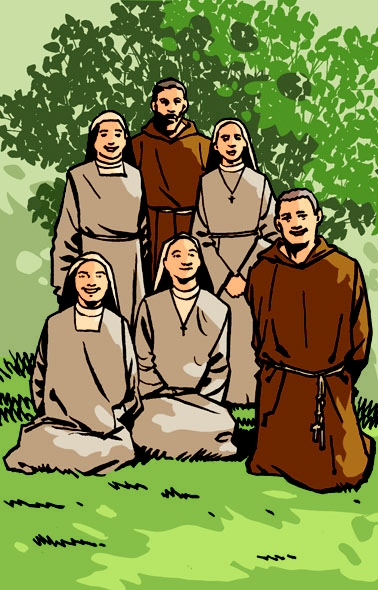 But on the contrary, and like the example of our Redeemer who knew how to express this prayer on the cross: “do not count this sin against them”, that I always love more the person who hurts me. Does Francis consider that it is an easy thing to do? No. Francis knows moreover that it is indeed very difficult, especially if the problems are big ones. And so he doesn’t hesitate, in his paraphrased Our Father, to invoke the Lord, humbly recognizing our incapacity to fully forgive: And if we do not forgive perfectly, Lord, make us forgive perfectly. And he continues by enumerating, at one and the same time the means and the fruit of this humble prayer: so that, for love of you, we may really love our enemies, and fervently pray to you for them, returning to no one evil for evil, by trying to serve you in everyone!
But on the contrary, and like the example of our Redeemer who knew how to express this prayer on the cross: “do not count this sin against them”, that I always love more the person who hurts me. Does Francis consider that it is an easy thing to do? No. Francis knows moreover that it is indeed very difficult, especially if the problems are big ones. And so he doesn’t hesitate, in his paraphrased Our Father, to invoke the Lord, humbly recognizing our incapacity to fully forgive: And if we do not forgive perfectly, Lord, make us forgive perfectly. And he continues by enumerating, at one and the same time the means and the fruit of this humble prayer: so that, for love of you, we may really love our enemies, and fervently pray to you for them, returning to no one evil for evil, by trying to serve you in everyone!
Compassion for our neighbor
Blessed is the man who bears with his neighbor according to the frailty of his nature as much as he would wish to be borne with by him if he should be in a like case. When we take the time to meditate on Francis’ admonition (Adm 18), the shortest of all, we notice that it is a true gem of brotherly life, particularly family life. Indeed, who is closer, as a neighbor, than our partner, child, father or mother, brother or sister? In this admonition, Francis prescribes compassion for our neighbor, i.e. that testimony of love which brings us to participate intimately in the ordeals that the other goes through and that we can literally name as “suffering with”. It is exactly the feeling of love and mercy that God lavished on suffering humanity: he was despised, the lowest of men... Yet ours were the sufferings he was bearing, ours the sorrows he was carrying (Is 53:3-4). In our suffering and ordeals, Francis invites us to support our neighbor, i.e. to help him stand upright, whether in a spiritual or physical aspect: And wheresoever the brothers are and may find themselves, let them mutually show among themselves that they are of one household. And let one make known his needs with confidence to the other, for, if a mother nourishes and loves her carnal son, how much more earnestly ought one to love and nourish his spiritual brother! And if any of them should fall into illness, the other brothers must serve him as they would wish to be served themselves (2 Rule 6:7-9).
 Through his writings, we see that Francis encourages us never to see ourselves as superman, who would be tempted to say, “Look here, you will see what you will see! I am the solution to all your problems!” No! Francis, always measured and balanced in his assessment of human nature, proposes humility in action: support of his neighbor according to the frailty of his nature (and not his own strength) he tells us in his admonition, and again: And let one make known his needs with confidence to the other, he specifies in his Rule. For I always “need the other”, in the same way that the other “needs” me. So it is in a family: we help the other to grow towards the Lord when we come to his aid, and we help him as much when we humbly accept his aid.
Through his writings, we see that Francis encourages us never to see ourselves as superman, who would be tempted to say, “Look here, you will see what you will see! I am the solution to all your problems!” No! Francis, always measured and balanced in his assessment of human nature, proposes humility in action: support of his neighbor according to the frailty of his nature (and not his own strength) he tells us in his admonition, and again: And let one make known his needs with confidence to the other, he specifies in his Rule. For I always “need the other”, in the same way that the other “needs” me. So it is in a family: we help the other to grow towards the Lord when we come to his aid, and we help him as much when we humbly accept his aid.
We spoke about help in its physical and spiritual aspects. Both are very often closely linked, one permitting the realization of the other. It so happens that Francis wrote a rule of several lines concerning hermitages. Hermitages were places that allowed brothers to go on retreats, “sojourns into the desert”. If it is difficult to compare these sojourns into the desert with daily family life, the rule for hermitages contains in spite of everything some short specifications which are entirely “transposable” to family life: Let the two who are “mothers” (the parents) keep the life of Martha and the two “sons” (the children) the life of Mary (Herm Rule 2). The two Gospel sisters symbolize active life for the one and contemplative life the other. The Gospel quotation seems to indicate that the reason and primary purpose of life in a hermitage for François was less ascetic flight from the world than the mystic desire and quest for God. Likewise, to generously welcome children and bring them up has less to do with the “proliferation” of the species and more to do with turning new hearts and souls to our Father in Heaven. A well-known Franciscan Tertiary (a member of the third order of Franciscans), the Holy Curé of Ars, summarized this idea very well in his sermons: “Fathers and mothers must know that their greatest occupation must be to work towards saving their children’s souls and that there is nothing which must come before that; even more, their own salvation is tied to that of their children.” And since for Francis life is an immense field of sharing, he concludes that the sons will take on from time to time the role of mothers, as if to say that the children must equally help their parents, materially and spiritually.
Avoiding unbecoming looks and the company of women
Article 17 of our Rule (that we will study a little further on) will speak to us notably about faithfulness. However, Saint Francis gives diverse practical stipulations to his brothers, stipulations which could just as easily be about conjugal faithfulness or, more largely, faithfulness to the divine commandment: You shall not commit adultery (Ex 20:14). The opening words of Francis’ first Rule’s article 12 summarize the practical provisions: Let all the brothers, wherever they are or may go, carefully avoid unbecoming looks, and company of women. Faced with such an assertion, which seems to suffer no objection, must we conclude that Francis is a formidable misogynist? Or worse still, that he implies that woman is the object and source of sin, and the simple fact of looking at her or of being next to her can entail perdition? This conclusion would be a complete travesty of Francis’ thought. It should be borne in mind that when Francis drafts this text, he is addressing his brothers, men then, and who do not benefit from the "protection" of a monastic wall. So, and with regard to the spirit of the text, we can be certain that if he had addressed women, he would have, for example, advised them not to dress so as to attract the roving eyes of men. Thus he does not say nor imply that women are the source or object of sin. Simply, Francis knows that the path that Satan most commonly uses to seduce the human soul is the carnal side of nature * We can equally profit from rereading the beginning of chapter 2 of this training manual, which which tells us the various forms of temptation used by Satan to create a rupture between the human creature and his Creator.. He also knows that, as Saint Paul says, the spirit is strong but the flesh is weak (1 Let 5). So, for Francis, the cardinal virtue of strength enabling resistance to the temptations of the flesh, goes hand in hand with two other cardinal virtues that are total abstinence and prudence:
- the brothers must avoid unbecoming looks at women : this is to master the source which can trigger the passions; it is temperance in looking. If one looks at a woman, it is not her body that we should look at but her soul.

- so that the brothers who are in the world avoid the fall, Francis prescribed prudence as the virtue of strength: No one should talk to or travel alone with a woman (1 Rule 12:2). The caution he prescribes goes as far as ordering his brothers to have no meetings or acts which could be seen to be the object of a bad interpretation in the eyes of a third party: I strictly command all the brothers not to have suspicious intimacy, or conferences with women, …that scandal may not arise on this account among the brothers or concerning the brothers (2 Rule 11).
We see then that the two means Francis stipulates to his brothers to help them live by their vow of chastity are directly transferable to anyone not himself a brother minor. For these other people, it would be respecting their vow of faithfulness, chastity or more simply the divine commandment: You shall not commit adultery. Thus husband or wife, young man or young woman, priest, etc., are concerned by these two good practical means that Francis firmly advises: 1) Do not give any unbecoming looks (or conversely, do not attract any unbecoming looks); 2) Do not put yourself into situations which could only encourage trouble, or which could be ambiguous.
Of the virtues putting vices to flight
This is the title of one of Francis’ admonitions (Adm 27). Below is a formidable presentation of the virtues to ask of the Lord so as to live by them in your family:
Where there is charity and wisdom there is neither fear nor ignorance.
Where there is patience and humility there is neither anger nor worry.
Where there is poverty and joy there is neither cupidity nor avarice.
Where there is quiet and meditation there is neither solicitude nor dissipation.
Where there is the fear of the Lord to guard the house the enemy cannot find a way to enter.
Where there is mercy and discretion there is neither superfluity nor hard-heartedness.
THE FAMILY
Article 17
In their family they should cultivate the Franciscan spirit of peace, fidelity, and respect for life, striving to make of it a sign of a world already renewed in Christ. * Rule « of Leo XIII », II 8..
By living the grace of matrimony, husbands and wives in particular should bear witness in the world to the love of Christ for His Church. They should joyfully accompany their children on their human and spiritual journey by providing a simple and open Christian education and being attentive to the vocation of everyone. * Vatican II, Constitution on the Church 41 e : « …Furthermore, married couples and Christian parents should follow their own proper path (to holiness) by faithful love. They should sustain one another in grace throughout the entire length of their lives. They should embue their offspring, lovingly welcomed as God's gift, with Christian doctrine and the evangelical virtues. In this manner, they offer all men the example of unwearying and generous love; in this way they build up the brotherhood of charity; in so doing, they stand as the witnesses and cooperators in the fruitfulness of Holy Mother Church; by such lives, they are a sign and a participation in that very love, with which Christ loved His Bride and for which He delivered Himself up for her. A like example, but one given in a different way, is that offered by widows and single people, who are able to make great contributions toward holiness and apostolic endeavor in the Church. Finally, those who engage in labor—and frequently it is of a heavy nature—should better themselves by their human labors. They should be of aid to their fellow citizens. They should raise all of society, and even creation itself, to a better mode of existence. Indeed, they should imitate by their lively charity, in their joyous hope and by their voluntary sharing of each others' burdens, the very Christ who plied His hands with carpenter's tools and Who in union with His Father, is continually working for the salvation of all men. In this, then, their daily work they should climb to the heights of holiness and apostolic activity. May all those who are weighed down with poverty, infirmity and sickness, as well as those who must bear various hardships or who suffer persecution for justice sake—may they all know they are united with the suffering Christ in a special way for the salvation of the world. The Lord called them blessed in His Gospel and they are those whom "the God of all graces, who has called us unto His eternal glory in Christ Jesus, will Himself, after we have suffered a little while, perfect, strengthen and establish" (1 Pet 5:10). Finally all Christ's faithful, whatever be the conditions, duties and circumstances of their lives—and indeed through all these, will daily increase in holiness, if they receive all things with faith from the hand of their heavenly Father and if they cooperate with the divine will. In this temporal service, they will manifest to all men the love with which God loved the world. » + Decree on the apostolate of the laity 30 b c: The training for the apostolate should start with the children's earliest education. In a special way, however, adolescents and young persons should be initiated into the apostolate and imbued with its spirit. This formation must be perfected throughout their whole life in keeping with the demands of new responsibilities. It is evident, therefore, that those who have the obligation to provide a Christian education also have the duty of providing formation for the apostolate. In the family parents have the task of training their children from childhood on to recognize God's love for all men. By example especially they should teach them little by little to be solicitous for the material and spiritual needs of their neighbor. The whole family in its common life, then, should be a sort of apprenticeship for the apostolate. Children must be educated, too, in such fashion that transcending the family circle, they may open their minds to both ecclesiastical and temporal communities. They should be so involved in the local community of the parish that they will acquire a consciousness of being living and active members of the people of God. …Teachers and educators on the other hand, who carry on a distinguished form of the apostolate of the laity by their vocation and office, should be equipped with that learning and pedagogical skill that are needed for imparting such education effectively. Likewise, lay groups and associations dedicated to the apostolate or other supernatural goals, should carefully and assiduously promote formation for the apostolate in keeping with their purpose and condition. Frequently these groups are the ordinary vehicle for harmonious formation for the apostolate inasmuch as they provide doctrinal, spiritual, and practical formation. Their members meet in small groups with their associates or friends, examine the methods and results of their apostolic activity, and compare their daily way of life with the Gospel. Formation of this type must be so organized that it takes into account the whole lay apostolate, which must be carried on not only among the organized groups themselves but also in all circumstances throughout one's whole life, especially one's professional and social life. Indeed, everyone should diligently prepare himself for the apostolate, this preparation being the more urgent in adulthood. For the advance of age brings with it a more open mind, enabling each person to detect more readily the talents with which God has enriched his soul and to exercise more effectively those charisms which the Holy Spirit has bestowed on him for the good of his brethren.
In their family, they will live by it
Our Rule’s form of life (i.e. the entirety of chapter II) covers a vast field of human and spiritual life. However, the "places" we can live out our spiritual life are not specified, with only one exception: In the family, they will live by it… We may wonder about the existence of such a specific statement in our Rule of life! Is it not indicated in this way so as to insist on the fact that it is “there” we must begin…?! In the same way as human existence, in its material aspect, begins and grows in the heart of a family, so does learning about love.
The family, which is founded and given life by love, is a community of persons: of husband and wife, of parents and children, of relatives. Its first task is to live with fidelity the reality of communion in a constant effort to develop an authentic community of persons. The inner principle of that task, its permanent power and its final goal is love: without love the family is not a community of persons and, in the same way, without love the family cannot live, grow and perfect itself as a community of persons. Man cannot live without love. He remains a being that is incomprehensible for himself, his life is senseless, if love is not revealed to him, if he does not encounter love, if he does not experience it and make it his own, if he does not participate intimately in it. * John-Paul II, apostolic exhortation Familiaris consortio, § 18, Pierre TEQUI Editor 1981.
To build such a family communion, one element is fundamental: an educational exchange between parents and children, which allows everyone to give and receive. Is there a more beautiful definition of family life than that of our Supreme Pontiff John-Paul II: “give and receive”? But give and receive what? We can now answer that easily: give and receive everything a human being needs to live, material needs (bread, clothes, a roof, …) and our need for love. For authentic Christian life is not a negation or a radical separation of the human and the spiritual but, on the contrary, a sublimation of the human in the spiritual.
Live by a Franciscan spirit of peace in your family
Why talk about a Franciscan spirit of peace ? Is peace multi-faceted? Yes! There are several ways to experience peace. The words Jesus Christ addressed to his apostles say it clearly : Peace I leave with you; my peace I give to you.
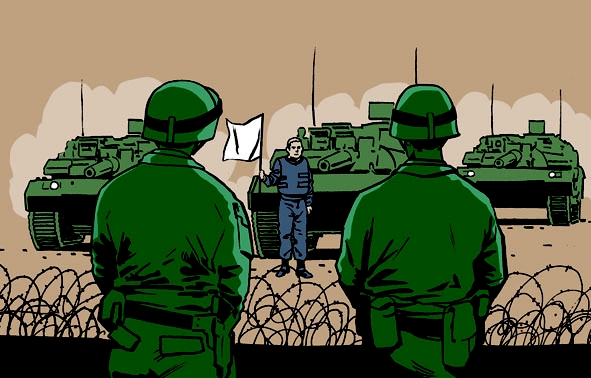 Not as the world gives do I give it to you (John 14:27). If Christ distinguishes between his peace and the world’s peace, it means there is necessarily a difference between the two. The world’s peace too often rests on a power struggle. A very well known expression of the world’s confidence in power: if you want peace, prepare for war! How many times have we seen this peace of men depend on the number or strength of arms held? However, as the history of the peoples tells us, power not always being on “our side”, speaking about only one aspect of things, the peace of man is particularly fragile. God’s peace, however, is without measure, limitless. It is expressed in the infinite love and mercy of God towards the repentant soul. And the Franciscan spirit of peace finds its source in this love of God which knows no limit. The few writings of Francis that we have “transposed” above and which are destined for the family apply concretely to the Franciscan spirit of peace in the family: neither quarrels nor slander, but brotherly love and a spirit of poverty; love those who strike you on the cheek; compassion for our neighbor.
Not as the world gives do I give it to you (John 14:27). If Christ distinguishes between his peace and the world’s peace, it means there is necessarily a difference between the two. The world’s peace too often rests on a power struggle. A very well known expression of the world’s confidence in power: if you want peace, prepare for war! How many times have we seen this peace of men depend on the number or strength of arms held? However, as the history of the peoples tells us, power not always being on “our side”, speaking about only one aspect of things, the peace of man is particularly fragile. God’s peace, however, is without measure, limitless. It is expressed in the infinite love and mercy of God towards the repentant soul. And the Franciscan spirit of peace finds its source in this love of God which knows no limit. The few writings of Francis that we have “transposed” above and which are destined for the family apply concretely to the Franciscan spirit of peace in the family: neither quarrels nor slander, but brotherly love and a spirit of poverty; love those who strike you on the cheek; compassion for our neighbor.
To help us explore and internalize this Franciscan spirit of peace, it may be useful to reread and meditate on Francis’ exhortations for the family given above as well as in chapter XI of this present manual, completely dedicated to peace.
Live by faithfulness in your family
Most of the time, marital faithfulness is regarded as the space which permits the development of a relationship and life plan, and not as a hardship * Tony Anatrella, Spouses, happy spouses… Trial of the marital bond, Flammarion 2004, p. 78.. So as not to repeat some of the preceding lines which already dealt with the theme of faithfulness, we will limit our comments to the following questions:
- how do we prepare, before the wedding, for faithfulness?
- why be faithful (we will speak about the indissolubility of marriage)?
- what is the “cement” of marital faithfulness?
- finally, is it possible to regain purity of soul after a fall in the domain of faithfulness to our spouse and so to divine commandment?
1. How do we prepare, before the wedding, for faithfulness ? On their wedding day, the spouses give themselves to each other, body and soul, exclusively. It is to offer this exclusivity that a young man or a young woman keeps his/her virginity until marriage. The possibility of offering this virginity, obviously, is not the only nor the primary reason. The first of all the reasons is that it is what the Creator commands in Genesis: That is why a man leaves his father and mother and clings to his wife, and the two of them become one flesh (Gen 2:24). This text is therefore not to be reversed in practice, reversal which would read: they become one flesh, and then the man clings to his wife! Even if the social context does not promote virginity before marriage, it is during our celibate life that we “train” for marital faithfulness; it will always be easier for a man or woman not having had any sexual encounter before the wedding day to be faithful to his/her spouse afterwards.
2. Why be faithful ? Regarding the union between man and woman in marriage, Saint Paul declares: This is a great mystery, but I speak in reference to Christ and the church (Eph 5:32). The union of man and woman should therefore not be considered as a simple imitation of the union of Christ and the Church; however, the union of man and woman by a sacrament which truly produces what it means participates in that reality.
 To say that marriage is a sacrament is to say that the bond which unites man and woman is not only a human one, but that it is the Holy Spirit who is the link. It is from there that we can understand the Church’s demands concerning indissolubility. The real reason for marriage’s indissolubility lies in this: the union of man and woman being the effective sign of the union of Christ and the Church (and by extension of the whole of humanity), man cannot separate himself from his wife in Christ’s image who does not separate himself from his Church. Finally, to this is added the word that the Verb of God, our Lord Jesus Christ opposes to the Pharisees who wanted to test him: But from the beginning of creation he made them male and female. This is why a man leaves his father and mother, and the two become one flesh. They are no longer two, therefore, but one flesh. So then, what God has united, human beings must not divide. (Mk 10 :6-9). The Church, educator and mother, is neither the author nor the arbitrator of such a standard. But it is convinced that there can be no contradiction between divine law regarding the transmission of life and that which asks to nurture true martial love. For the concrete teaching of the Church must always be bound to divine law and never separated from it. Our Supreme Pontiff John-Paul II repeated it with the same conviction as his predecessor: To diminish in no way the saving teaching of Christ constitutes an eminent form of charity for souls. * Paul VI, Encyclical Humanae vitae, 29.
To say that marriage is a sacrament is to say that the bond which unites man and woman is not only a human one, but that it is the Holy Spirit who is the link. It is from there that we can understand the Church’s demands concerning indissolubility. The real reason for marriage’s indissolubility lies in this: the union of man and woman being the effective sign of the union of Christ and the Church (and by extension of the whole of humanity), man cannot separate himself from his wife in Christ’s image who does not separate himself from his Church. Finally, to this is added the word that the Verb of God, our Lord Jesus Christ opposes to the Pharisees who wanted to test him: But from the beginning of creation he made them male and female. This is why a man leaves his father and mother, and the two become one flesh. They are no longer two, therefore, but one flesh. So then, what God has united, human beings must not divide. (Mk 10 :6-9). The Church, educator and mother, is neither the author nor the arbitrator of such a standard. But it is convinced that there can be no contradiction between divine law regarding the transmission of life and that which asks to nurture true martial love. For the concrete teaching of the Church must always be bound to divine law and never separated from it. Our Supreme Pontiff John-Paul II repeated it with the same conviction as his predecessor: To diminish in no way the saving teaching of Christ constitutes an eminent form of charity for souls. * Paul VI, Encyclical Humanae vitae, 29.
3. What is the cement of marital fidelity ? To introduce the answer to this question, we would like to report the results of a survey on divorce carried out at the beginning of the 1980s in a state in the U.S.A.:
- in the case of civil wedding only, there was regrettably 1 divorce for every 2 marriages;
- for religious weddings of those spouses who had never “put foot” in church before the marriage nor afterwards, there was 1 divorce for every 3 marriages;
- for religious weddings with weekly religious practice afterwards but no daily family prayer, there was 1 divorce for every 40 marriages;
- for religious weddings with weekly religious practice afterwards and daily family prayer, there was 1 divorce for every 1,106 marriages.
 The two principal conclusions of this survey emerge clearly: the first is that the “cement” of marriage finds its source in God. The second is that prayer is the canal through which divine grace flows into our souls. All those who accept opening their souls to their Creator, Redeemer and Savior, find in Him the supernatural strength helping them to experience, here on earth, the Kingdom of Heaven’s joy.
The two principal conclusions of this survey emerge clearly: the first is that the “cement” of marriage finds its source in God. The second is that prayer is the canal through which divine grace flows into our souls. All those who accept opening their souls to their Creator, Redeemer and Savior, find in Him the supernatural strength helping them to experience, here on earth, the Kingdom of Heaven’s joy.
4. Is it possible to regain purity of soul after a fall in the domain of faithfulness to our spouse and so to divine commandment? In other words, can a person who commits a fault or faults against purity “regain” his lost virginity? The Gospel gives us a positive answer, citing several examples of this refound purity, such as the passage of the repentant and forgiven sinner (Lk 7:47-48): For this reason I tell you that her sins, many as they are, have been forgiven her, because she has shown such great love. … Then he said to her, “Your sins are forgiven.” To show to what extent the restoration of purity is always possible, despite the baseness and multiplicity of faults which were committed, the Gospel also reports an eminent reconciliation of the creature with its Creator: that of Mary-Magdalene, the sinner, the woman with seven demons. It wasn’t only one demon which possessed her but seven (Lk. 8:2), as many as the seven deadly sins! But her repentance and willingness to no longer sin gained her divine forgiveness.
 Thus the person at first guilty and imperfect becomes just, and so the conscience is purified in the bath of humility, contrition and love. Cleansed, she can “rival” those who, never having fallen, have always been pure. What degree of purity must Mary-Magdalene have attained to have been the first beneficiary of the risen Christ’s appearance on Easter Sunday morning * It is possible that during the night, Jesus is risen and appears (firstly) to his mother. It is pure hypothesis but supported by plausibility and the fact that she was at Calvary but did not go to the sepulchre of her son: in proportion to her grieving thoughts, the consolation of her God caressed her soul (Cf. Psalms 93). MJ Lagrange and C. Lavergne, Synopsis of the four Gospels in French according to the Greek synopsis, Librairie Lecoffre J. Gabalda and Cie Editors, 1993, note 306, page 254. : Jesus said, 'Mary!' She turned round then and said to him in Hebrew, 'Rabbuni!' -- which means Master, and what unique mission was she invested with, she, the former sinner with seven devils: go to the brothers, and tell them… (John 20:16-17).
Thus the person at first guilty and imperfect becomes just, and so the conscience is purified in the bath of humility, contrition and love. Cleansed, she can “rival” those who, never having fallen, have always been pure. What degree of purity must Mary-Magdalene have attained to have been the first beneficiary of the risen Christ’s appearance on Easter Sunday morning * It is possible that during the night, Jesus is risen and appears (firstly) to his mother. It is pure hypothesis but supported by plausibility and the fact that she was at Calvary but did not go to the sepulchre of her son: in proportion to her grieving thoughts, the consolation of her God caressed her soul (Cf. Psalms 93). MJ Lagrange and C. Lavergne, Synopsis of the four Gospels in French according to the Greek synopsis, Librairie Lecoffre J. Gabalda and Cie Editors, 1993, note 306, page 254. : Jesus said, 'Mary!' She turned round then and said to him in Hebrew, 'Rabbuni!' -- which means Master, and what unique mission was she invested with, she, the former sinner with seven devils: go to the brothers, and tell them… (John 20:16-17).
Live by respect for life in the family
In the analysis of article 17 of our Rule, we wanted to distinguish faithfulness from respect for life. This is only through pure teaching necessity, because the article’s text associates the two aspects as if they formed just one. It is a question of faithfulness and respect for life. To respect life is above all to live in faithfulness to the Lord, docile to all his commandments, which are life for man: You must love the Lord your God with all your heart, with all your soul, with all your strength, and with all your mind, and your neighbor as yourself. Yet from the Christian perspective, love is not a feeling, the latter being inevitably short-lived, but an attitude of long-lasting spirit which directs relationships with others. Love is a burgeoning relationship, a work in progress. It is a project to work on in history rather than a relationship enshrined in stone. And it finds its source in love bigger than itself: love of the Triune God. God loves because God is love (1 John 4 :7), and this love is poor, humble, powerless, fragile because it is selfless. It took a human face in the person of Christ who, by accepting to appear weak, without invading anyone’s space, humbled himself by taking on the human condition to reveal himself to men. This love of the Triune God also means: I want you to live. To say that God loves all men is to say that He desires all men to live in the strongest sense of the word, and not simply to live without conflicts by practicing a morality of goodwill. In other terms, it means that in the name of this love, we cannot accept everything, especially if this or that attitude endangers life. Charity only begins when we pursue a relationship with God; then it reaches a universal significance which leads the subject to love his fellow man, in the sense of “wishing him well”, acting responsibly towards them, knowing how to be delicate and discreet, respectful. This love has no other motivation than to be creator, since to love does not consist in denying or smothering our desires but to see them in a more global context. Christian love invites us then to renounce the possession of the other, and the death of this latter in ourselves, so as to free life impulses which allow bonds to be created, in their turn sources of happiness, pleasure and enjoyment. * These last lines are extracted from Tony Anatrella (CJ), The Church and Love, Champs Flammarion, 2000, p. 86 and following.
In this context we fully understand that in the family, which is a community of persons, special attention must be devoted to the children by developing a profound esteem for their personal dignity, and a great respect and generous concern for their rights. This is true for every child, but it becomes all the more urgent the smaller the child is and the more it is in need of everything, when it is sick, suffering or handicapped. By fostering and exercising a tender and strong concern for every child that comes into this world, the Church fulfills a fundamental mission: for she is called upon to reveal and put forward anew in history the example and the commandment of Christ the Lord, who placed the child at the heart of the Kingdom of God: Let the children come to me, and do not hinder them; for to such belongs the kingdom of heaven. (Mt 19:14, Mk 10:14, Lk 18:16). * John-Paul II, apostolic exhortation Familiaris consortio, § 26, Pierre TEQUI Editor, 1981..
Sign of a world already renewed in Christ
In a world where the law of the strongest is always the best…
In a world which promotes base or alienating behavior for man, behavior that we especially don’t want to question but simply legitimize…
In a world which denies life to others, particularly in the most fragile moments of its existence, denial of life structured by social norms which the citizen is expected to adhere to…
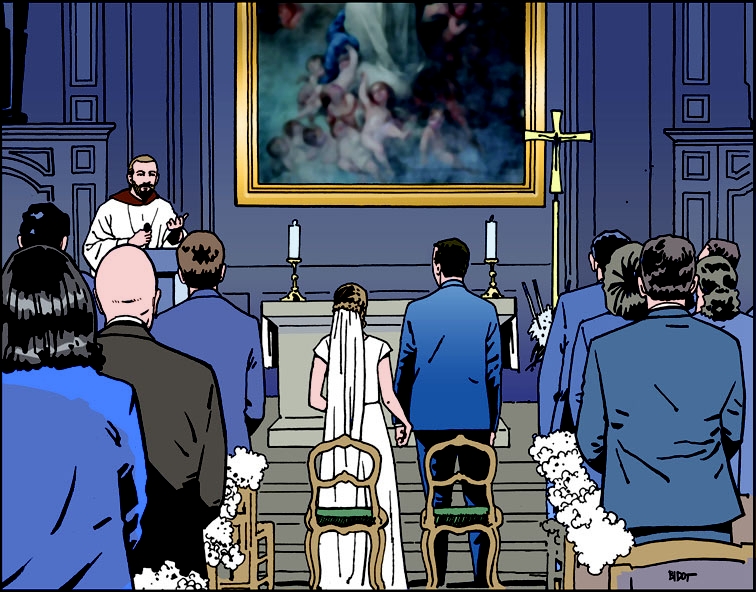
…the secular brothers and the sisters of saint François will live by, in their family, the Franciscan spirit of peace, faithfulness and respect for life, trying to show in that way a sign of a world already renewed in Christ. Renewed means made new, with a connotation of rebirth after something which has fallen. So, in a world which doesn’t love, or loves little or badly, where the inevitable effect is the death of the other or a part of the other, to be a sign of a world already renewed in Christ means what if not living according to the word of Christ himself, Word of love and Word of life:
Peace I bequeath to you, my own peace I give you, a peace which the world cannot give (John 14:27)…
But from the beginning of creation he made them male and female. This is why a man leaves his father and mother, and the two become one flesh. They are no longer two, therefore, but one flesh. So then, what God has united, human beings must not divide (Mk 10 :6-9)…
Let the children come to me, and do not hinder them; for to such belongs the kingdom of heaven. (Mt 19:14, Mk 10:14, Lk 18:16)…
Marriage, a great adventure
Marriage, like any sacrament, is not a wave of a magic wand which, once received, empowers the spouses to do and to continue without effort. The statistical results of the survey mentioned above are an eloquent testimony to that. So, and before speaking about marriage’s blessings, let us use a metaphor at the same time intended for the happy couple as well as for future spouses in the discernment which they have to make before commitment. This metaphor is one of a big sailing ship. The first thing it is composed of is the hull. Of all the constituent elements of the ship, it is the heaviest. It symbolizes the body, with its impulses, passions and… its limits. In the ship, the hull is not enough by itself, just as in life, the physical aspect is not sufficient in itself. If the hull was placed in the middle of the ocean, no matter what its dimensions, we can be sure that sooner or later, left to its own devices, it would smash on the rocks. It is the same for a conjugal relationship. If the physical is an integral part of a relationship, it is not enough on its own for living in the strongest sense of the word. We need then something more, which allows the ship to go forward. This something is the sails. They symbolize love. The Church, from its beginning, had to deal with many models of marriage which excluded the emotion of love in the marital relationship. Yet the love spouses feel for each other is not less necessary than the sails that drive a ship forward. However, even with sails, the greatest of ships can still smash on the rocks, because if sails allow the ship to move forward, they remain insufficient to direct the ship. A third element, then, is needed, the smallest of all, which enables the ship to go wherever it would like. This element is the rudder which symbolizes the will. But the will of what?
- Well, the will to find the source of our love in this love bigger than ourselves that is love of the Triune God
- The will to direct the relationship with the other in a spirit which seeks permanence.
- The will to build, day after day, a love which brings life to and nourishes the other.
This teaching embraces all married life. The concern to give and pass on life is part of the whole of Christian life’s mission which, without the cross, cannot reach resurrection. In this context, we understand that it is not possible to eliminate sacrifice in family life, but that on the contrary it is to be accepted wholeheartedly (it is the necessity of the rudder’s existence) so that conjugal love, day after day, deepens and becomes a source of intimate joy.
Marriage’s blessings
It is in the celebration of the sacrament of marriage itself that we find enumerated the main out of many Christian marriage blessings. The celebrant addresses the fiancés with these words:
You have listened to the Word of God which revealed to men the meaning of love and marriage. Yes! It is the Word of God which reveals that God is Love, that He is source of all love and that our reason for being, i.e. the direction of all our life, is to love. The sacrament of marriage gives to the spouses the possibility of living a relationship of love with God. Through the sacrament, God gives us the Holy Spirit, love’s strength, which will sanctify the spouses’ love for each other. The more the spouses strengthen their union in a mutual love of God, the more they will receive blessings from this sacrament. Then the celebrant continues and the fiancés respond…
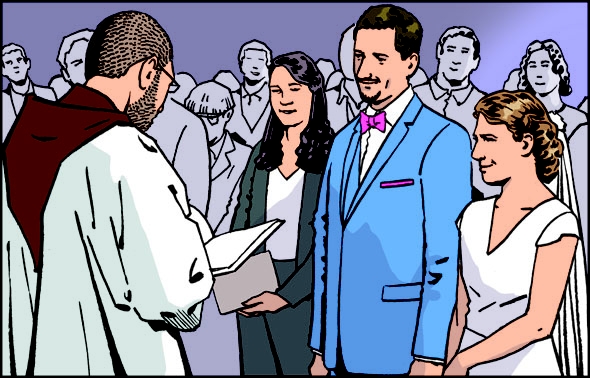 Have you come here to enter into marriage without coercion, freely and wholeheartedly ? The question asked by the celebrant is not trivial. The wedding sacrament, so that it is valid and thus bears fruit, demands the fiancés’ freedom in their commitment, with no coercion: Yes, they answer. Since its beginning, the Church asks that marriage be one of love. If one of the fiancés considered him/herself to have been coerced to come “to the end of the great aisle”, he could (should) respond no to the question asked by the celebrant. Everyone present at the ceremony could regret that this no is expressed so late in the game. Just the same! Marriage is not a simple administrative formality, or a civil contract which can be broken. It is a sacrament which unites, and in a dissoluble way, a man and a woman for life. The commitment must be spotless. Then the celebrant continues and the fiancés respond:
Have you come here to enter into marriage without coercion, freely and wholeheartedly ? The question asked by the celebrant is not trivial. The wedding sacrament, so that it is valid and thus bears fruit, demands the fiancés’ freedom in their commitment, with no coercion: Yes, they answer. Since its beginning, the Church asks that marriage be one of love. If one of the fiancés considered him/herself to have been coerced to come “to the end of the great aisle”, he could (should) respond no to the question asked by the celebrant. Everyone present at the ceremony could regret that this no is expressed so late in the game. Just the same! Marriage is not a simple administrative formality, or a civil contract which can be broken. It is a sacrament which unites, and in a dissoluble way, a man and a woman for life. The commitment must be spotless. Then the celebrant continues and the fiancés respond:
Are you prepared, as you follow the path of marriage, to love and honor each other for as long as you both shall live ? At the precise moment when the fiancés are bound by consent expressed in a sensitive way, they receive an abundance of sanctifying grace, i.e. that gift that God makes of Himself by coming to live in their souls. The sacrament of marriage also gives ongoing blessings, i.e. that momentary supernatural gift which God gives to help do good and avoid evil. These received graces spring forth at appropriate times to strengthen conjugal love and help the spouses remain faithful to each other. Then the celebrant continues and the fiancés respond:
Are you prepared to accept children lovingly from God and to bring them up according to the law of Christ and his Church? Marriage’s first visible blessing is that of becoming spouses to each other. Through the fiancés’ consent, the theological and moral virtues bring them a fresh vigor. Charity, especially, is perfected, patience becomes stronger, piety more profound. These blessings are seen concretely in the mutual help the spouses give each other. But there is another blessing from marriage: fecundity. The first fecundity that comes to mind is obviously the joy of welcoming all the children that God grants the couple. This blessing of fecundity calls for another blessing: that of assuming responsibility (in the positive meaning of the word) of raising a child.
 How beautiful this term raising! For though we train an animal, the child is raised by his parents. To raise her in human life, which will bring her to assume in her turn her own existence when she is an adult; to raise her in her spiritual life so that she knows how to direct her soul and act towards Our Father in Heaven.
How beautiful this term raising! For though we train an animal, the child is raised by his parents. To raise her in human life, which will bring her to assume in her turn her own existence when she is an adult; to raise her in her spiritual life so that she knows how to direct her soul and act towards Our Father in Heaven.
The exchange of vows : we will note in passing the terms used. If we find many “I”s and “you”s (as you might legitimately imagine), we equally find terms which give the state of mind of what married life is, completely directed to welcoming the other and the gift of oneself: … I receive you as spouse and I give myself to you, to love you and honor you all the days of my life. The spouse receives the other, but does not take him; the spouse gives himself to the other, which shouldn’t give occasion to the other to take things for granted. The sacrament of matrimony concludes with a blessing and an exchange of rings…
Wedding rings are not « rings », which hinder the freedom of those who wear them. They are a visible though silent sign before all men of the spouses’ will to always keep a perfect faithfulness to each other, just like Christ and his spouse, the Church, are faithful to one another.
Showing the world Christ’s love for his Church
In the Old Testament, the prophets spontaneously expressed God’s relationship with his creature in the form of conjugal union and sometimes, sadly, of conjugal separation. Instinctively they used what is strongest in the order of nature, the union of spouses, two in one flesh, to show what is strongest in the order of grace: the union with God through community of thought, desire and love.
We sometimes find, turning a page of Saint Thomas of Aquinas’ Summa Theologica, a summarizing paragraph, often direct, sometimes unexpected, always surprising. The one we are going to look at now, not the least, interests us particularly: There are, says Saint Thomas, four great sacraments: baptism, because of its effects; confirmation, because of its minister (a bishop); the Eucharist, because of its content; finally, matrimony, because of what it symbolizes, what it is a sign of * Summa Theologica, IIIa pars quest. 65 art. 5 ad 4, quest. 67 art. 2 ad 3.. And actually, when Saint Paul speaks about Christian marriage, he teaches that the husband must love his wife and treat her as he would his own body. And he finds the model in Christ’s love for his Body which is the Church: This is a great mystery, but I speak in reference to Christ and the church (Eph 5:32). The result is this paradox that the sacrament which seems the most anchored in carnal reality, since it has as much for matter as for form the function of nature itself, human love in all its dimensions including the physical, this sacrament is also the most mystical, the fullest of spiritual meaning * It is so to such an extent that those who renounce matrimony for the sake of the kingdom of heaven (Mt 19 :12) live « to the full » the supernatural reality in Christ and in the Church: true reality is the invisible..
Thus human love, love of a man for a woman, is the most visible manifestation in the world of Christ’s love for his Church. And our article 17 invites the secular Franciscan brothers and sisters who are married to show this reality to the eyes of the world by living the blessings of marriage in their conjugal life. What a mission! What a supernatural reason to listen to and follow Francis’ exhortations, quite simple and natural, for the family!
Christian education, simple and open
Christian education means that parents have the mission to raise their children in a Christian way. No pastor of the soul, as talented as he may be, could ever pass on faith to a child as simply and profoundly as the parents themselves. The family is the first and main place in which faith is communicated. At the risk of repeating myself, let’s remind ourselves of what the Holy Curé of Ars said: « Fathers and mothers must know that their greatest occupation must be to work towards saving their children’s souls and that there is nothing which must come before that; even more, their own salvation is tied to that of their children. »
Do not think that having never taken theological studies, parents must or should abdicate their educative and evangelizing mission towards their children.
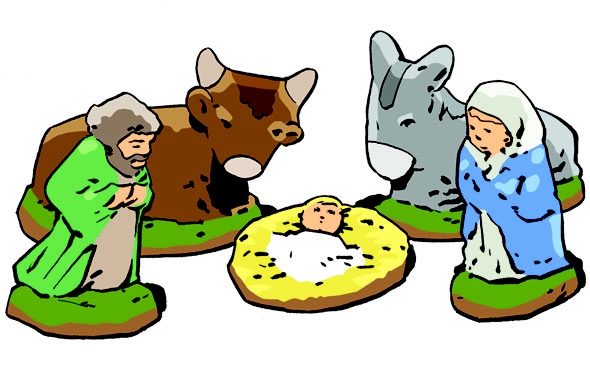 The family is a domestic church. It is a “school in the service of the Lord » like Saint Benedict says, a small family monastery where all the family, parents and children, apply themselves to the study and consolidation of the things of God, to the practice of praying together, to the active and conscious participation in the Church’s liturgical life. What could be simpler than praying together everyday? What could be simpler than preparing, as a family, the nativity scene at the beginning of Advent? And to speak, during the weeks before Christmas, of the coming of Christ to the earth? These are very simple ways to raise children in faith. Or, if you want to open a “good bottle” for independence day, that’s fine, and God doesn’t forbid it; but if you do it on Sunday after having heard the Gospel of the wedding in Cana, for example, and you explain to the children the reason for the celebration * On this matter, and if the example gave ideas to some, they could reread with profit § contained in chapter VII of the present manual and entitled « Water changed into wine: Building a Brotherly and Evangelical World »., it is certainly better!
The family is a domestic church. It is a “school in the service of the Lord » like Saint Benedict says, a small family monastery where all the family, parents and children, apply themselves to the study and consolidation of the things of God, to the practice of praying together, to the active and conscious participation in the Church’s liturgical life. What could be simpler than praying together everyday? What could be simpler than preparing, as a family, the nativity scene at the beginning of Advent? And to speak, during the weeks before Christmas, of the coming of Christ to the earth? These are very simple ways to raise children in faith. Or, if you want to open a “good bottle” for independence day, that’s fine, and God doesn’t forbid it; but if you do it on Sunday after having heard the Gospel of the wedding in Cana, for example, and you explain to the children the reason for the celebration * On this matter, and if the example gave ideas to some, they could reread with profit § contained in chapter VII of the present manual and entitled « Water changed into wine: Building a Brotherly and Evangelical World »., it is certainly better!
Open is defined as « offering no natural or artificial obstacle ». But an « open » Christian education, what does that mean? The note to which article 17 of our Rule refers makes reference to the decree of the apostolate of the laity, which gives us some insight. It specifies that it is necessary to educate children in such a way that outside of the family circle they open their spirit to community life, ecclesial as well as temporal. There can thus be no question of confining the child to the family nest; the baby bird must one day take flight and fly on its own, encountering the rest of the world, with all that that implies. In that way, the child discovers himself and finds out still more about his Creator and what God expects of him. The decree continues on this subject: With age, the spirit opens more and we are all more able to find the talents imparted to us by God and use more effectively the charisms that the Spirit gave us for the good of our brothers. In its concrete application, open Christian education will in particular consist in bringing awareness to the child that God loves all men and that He invites us to do the same (For if you love those who love you, what recompense will you have? Do not the tax collectors do the same? Love your enemies…). That will also mean, for example, that no question of the child is considered as not deserving of an answer (there is no question which is taboo).
Being attentive to the vocation of everyone
 This specification of our Rule, being attentive to the vocation of everyone, covers two aspects of childhood education which are complementary and free from opposition. Firstly, each child has his vocation (vocation to matrimony, to religious life, to the priesthood, …). It is not then for the parents to have the vocation in the place of their children. However, and this is the second aspect, the parents cannot consider that the vocation of their child does not concern them, that it is not their problem! They must be attentive, i.e. surround each child with attention, know how to dialogue with him to help him discern what is good and what is bad. Francis of Assisi, in a letter that he writes to Brother Leo in response to the latter’s question and by which this latter would really prefer that Francis “decide » for him, charts perfectly this double aspect which is best left up to parents. It is worth noting in passing that Francis, in this instance, compares himself to a mother speaking to her child, which exactly fits our subject: Brother Leo, health and peace from Brother Francis! I am speaking, my son, in this way—as a mother would—because I am putting everything we said on the road (which we could translate by: everything that we have brought you, your father and I, during all these years we have helped you to grow up) in this brief message and advice… In whatever way it seems better to you to please the Lord God and to follow His footprint and poverty, do it with the blessing of the Lord God and my obedience. Francis thus leaves Leo his total freedom of choice, just like parents have to leave their children total freedom in the choice of their vocation. But leaving total freedom of choice does not mean not showing any interest in the child. Francis is concerned with the general direction of the choice, that which is indispensable, no matter what the choice of vocation: to please the Lord God and to follow His footprint and poverty. It is this same attention that the parents must have towards their children. And Francis concludes, as if to fully reassure his brother Leo that he will not abandon him, but that on the contrary he is attentive to him: And if you need and want to come to me for the sake of your soul or for some consolation, Leo, come!
This specification of our Rule, being attentive to the vocation of everyone, covers two aspects of childhood education which are complementary and free from opposition. Firstly, each child has his vocation (vocation to matrimony, to religious life, to the priesthood, …). It is not then for the parents to have the vocation in the place of their children. However, and this is the second aspect, the parents cannot consider that the vocation of their child does not concern them, that it is not their problem! They must be attentive, i.e. surround each child with attention, know how to dialogue with him to help him discern what is good and what is bad. Francis of Assisi, in a letter that he writes to Brother Leo in response to the latter’s question and by which this latter would really prefer that Francis “decide » for him, charts perfectly this double aspect which is best left up to parents. It is worth noting in passing that Francis, in this instance, compares himself to a mother speaking to her child, which exactly fits our subject: Brother Leo, health and peace from Brother Francis! I am speaking, my son, in this way—as a mother would—because I am putting everything we said on the road (which we could translate by: everything that we have brought you, your father and I, during all these years we have helped you to grow up) in this brief message and advice… In whatever way it seems better to you to please the Lord God and to follow His footprint and poverty, do it with the blessing of the Lord God and my obedience. Francis thus leaves Leo his total freedom of choice, just like parents have to leave their children total freedom in the choice of their vocation. But leaving total freedom of choice does not mean not showing any interest in the child. Francis is concerned with the general direction of the choice, that which is indispensable, no matter what the choice of vocation: to please the Lord God and to follow His footprint and poverty. It is this same attention that the parents must have towards their children. And Francis concludes, as if to fully reassure his brother Leo that he will not abandon him, but that on the contrary he is attentive to him: And if you need and want to come to me for the sake of your soul or for some consolation, Leo, come!
They should joyfully accompany their children on their human and spiritual journey
A child is not a burden! She is a gift of God, and what a gift! It is life given by God; it is creation which continues by giving to parents the grace to participate in the divine creation. Parents should be able to sing with Mary: “The Almighty has done great things for me. Holy is his name.” No sadness, then, in Mary’s Magnificat in which our Rule invites us to commune. Joy is moreover one of the Franciscan charisms. Francis notices one day that one of his companions seems dark and despondent; he scolds him a bit roughly: A servant of God must not seem sad and sullen before men, but, on the contrary, always pleasant. Go to your room to review your sins; weep and moan before God; but on your return among your brothers, leave behind your gloom and act like the others (2 C 128). Francis has such esteem for the person full of spiritual joy that in one chapter he adds this recommendation to the Rule: And let them take care not to appear exteriorly sad and gloomy like hypocrites, but let them show themselves to be joyful and contented in the Lord, merry and becomingly courteous (1 Rule 7:15-16). But does living in joy have the effect of erasing all our problems? More to the point, should we imagine that childhood education involves no problems? An old French saying astutely and accurately expresses the difficulties that all parents will experience with their children: “small children, small worries; big children, big worries”. And no one seems to be exempt from these inevitable parental worries. Look at Mary and Joseph’s torment when seeking the “little runaway Jesus” in vain for three days: My child, why have you done this to us? See how worried your father and I have been, looking for you! (Lk 2:48). What a kid, this little Jesus! And it won’t stop there since later, a sword will go so far as to pierce his mother’s heart… Nevertheless, even during difficult times, the Gospel tells us about Mary’s trust: His mother stored up all these things in her heart (Lk 2:51). With Mary, it is never an exuberant, resounding joy. It is an interior joy which inhabits all her being: My soul proclaims the greatness of the Lord and my spirit rejoices in God my Savior! (Lk 1 :46-47).
But what in their children must parents joyfully nurture ? The journey, i.e. a path of perpetual becoming. But human journey first, then spiritual journey. So as parents we cannot consider the spiritual part of our children’s itinerary to be the most important, even if that is what is “at the end of the road”. That would be to lack balance. So as not to “forget” to follow the human itinerary, it is worth noting how our Rule cites it first in its enumeration, as if to signal that it is there that we should begin and, at the same time it is not there that we should end… Let us follow in that way our Creator’s example. He knew how to surround the Incarnation of his Son with human parents who fed him, clothed him, taught him to walk, etc. And, quickly, as if to remind parents that there is not only the human, God the Father gives us this sentence out of the mouth of his little man: Why were you looking for me? Did you not know that I must be in my Father's house? (Lk 2 :49).
Finally, in the sentence they should joyfully accompany their children on their human and spiritual journey, what does the singular their journey preceded by the plural their children mean. Several things, actually. The first and most important is that each child is unique. So if we live joyfully in the family with all our children, it is each child taken individually that we must nurture. But this sentence of our Rule also has another meaning which adds to what was just stated: the parents themselves are invited to joyfully nurture their own human and spiritual journey, with their children. And with the Mother of Jesus, they will be able sing: “from now on all ages will call me blessed …”
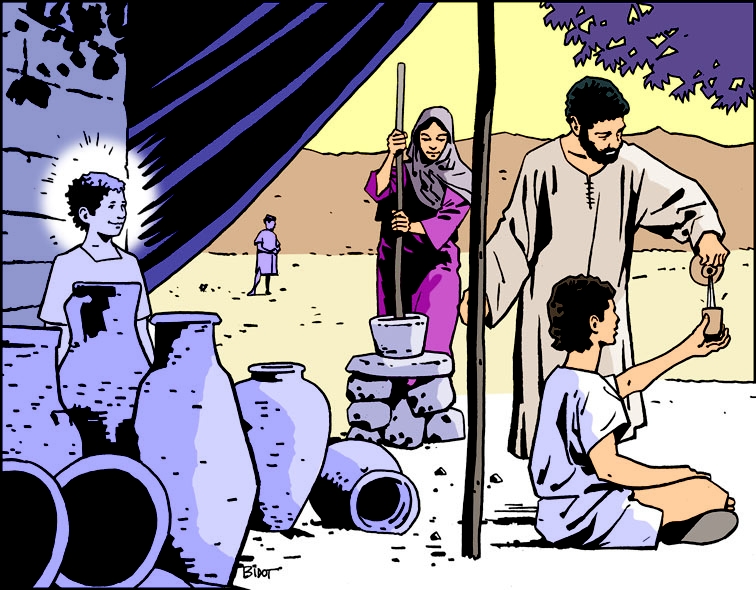
QUESTIONS
What did I retain?
1) Man and woman have the duty to become always more of what they already are. But what are they already? Moreover, what is the family?
2) Can I give Francis’ responses to the following questions :
- What do I do in a family so that everything « goes well » ?
- What do I do in a family when « everything » goes wrong ?
- How, in a family, do I help my spouse in need, or my brother, sister, child, father or mother ?
- What means can I use to prepare to live by and then to live by without fail, the divine commandment : you will not commit adultery ?
- What puts vice to flight ?
3) The holy Curé of Ars, Tertiary of Saint Francis himself, teaches us what the greatest occupation for fathers and mothers must be. Can I say what that preoccupation is?
For further reflection
1) The liturgy proposes Psalm 127 between the two readings for the sacrament of matrimony. Can I look for and extract the allegorical, moral and anagogical spiritual meaning (see, if necessary, the definitions of these different meanings at the beginning of chapter VII)? Married, parent, child, single, priest or religious, what resonance can this Word of God have in my life?
2) After having made a short summary analysis of Francis’ first rule’s article 11, and in view of this, can I decide what efforts I must make from today, with God’s grace, towards my spouse, children, parents?
3) Beneficiary of a human or spiritual filiation, what concrete means am I going to put into place with “my” children to work for the salvation of their souls?


